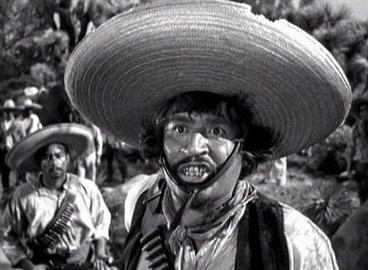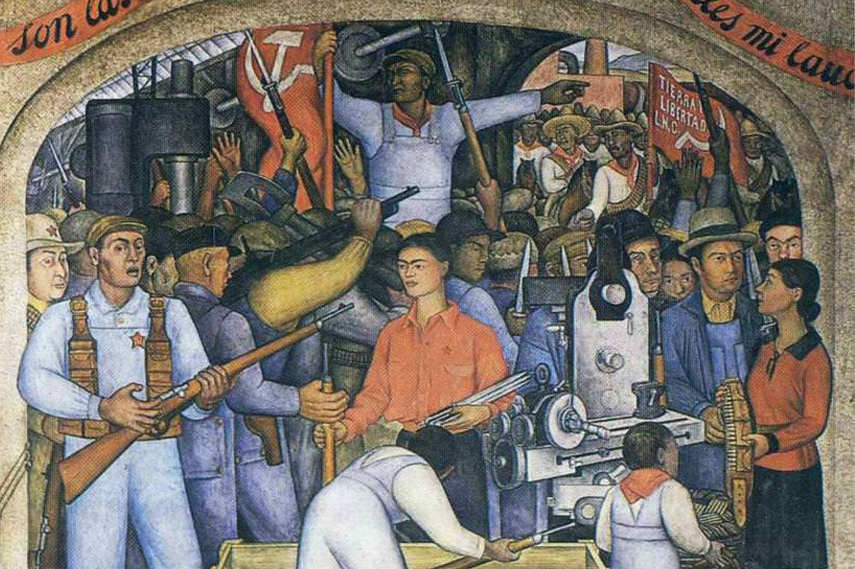Fred Reed
DOUBLE PREFATORY NOTE
This piece has the rare distinction of being introduced by two voices: the founding editor's and that of our editor emeritus, Joe Bageant.
Fred Reed is a libertarian conservative, and judging from our left perspective, he sometimes says (and has said) some pretty outrageous things. We are not talking here about punching holes in the stifling sanctimonious liberal PC, where we join him, as neither he nor we can brook prigs. We are talking about some deeper ideological issues like Fred's normally robust embrace of US exceptionalism, tinged with faint but still audible strains of nativism. That said, Reed is also a strong, original and highly refined iconoclastic mind, unafraid to tell it like it is to friend and foe alike, the mark of a useful public intellectual. We think that dogmatic leftists who reject his work out of hand are missing something. Not to mention the fun that Reed's copy often represents. Basically, when Reed is good, he's tops. When he's bad, he's pretty infuriating. But, hell, the overall effect is usually salutary, for Reed is unpredictable, and his writing, even when off the mark, always packs provocative nuggets of truth and unusual insight. Doubt it? Try this piece on Mexico, and see how Reed can be spot on, and defend Mexicans, well, in his own style, without resorting to the pusillanimous liberaloid canon. (Don't worry: we never publish pieces we totally disagree with, no matter who wrote them, and if we do, we point out where our objections lie.) Oh, by the way, Fred knows his subject well. He has lived in Mexico for well over a decade, and loves it.—Patrice Greanville, editor
Here's the warning about Fred by Joe Bageant:
Fred Reed, who has referred to Oprah Winfrey as looking "like five hundred pounds of bear liver in a plastic bag," takes a jaundiced and highly irreverent view of all things sacred-journalism, marriage, affirmative action, federal scams, governmental uselessness, women, men, fellow reporters, and popular culture. On the other hand, he has a kind word for drunks, bar girls, and children. Neither a liberal nor a conservative-he describes these as "twin halves of the national lobotomy"-he is just Fred. He figures it is enough. Anything more would be multiple-personality disorder. Fred has spent many years doing things your mother wouldn't want you to do, such as living in alleys in Taipei, Bangkok, and Saigon, with some of the strangest people ever to crawl this weary earth. Once a war correspondent in Viet Nam and Cambodia, then for years a police reporter in places the media don't admit exist, he spent most of a decade writing a syndicated column on matters military. While he tends to write with wit, he has seen, he says, a lot of ugly things, and doesn't like the people responsible. He says so. Fred may charm or offend, but he'll keep your attention...--Joe Bageant, author of Deer Hunting with Jesus, editor emeritus, The Greanville Post.
Mexico is a lot lot more than most gringos imagine.
Some Stuff Worth Knowing
FRED REED • Original dateline NOVEMBER 16, 2017
 [dropcap]F[/dropcap]or Americans concerned about Mexico and Mexicans, and what sort of wights they be, a little history may help. We seem to know almost nothing about a bordering nation of 130 million. It is not what most of us think it is. It is certainly not what the Loon Right would have us believe.
[dropcap]F[/dropcap]or Americans concerned about Mexico and Mexicans, and what sort of wights they be, a little history may help. We seem to know almost nothing about a bordering nation of 130 million. It is not what most of us think it is. It is certainly not what the Loon Right would have us believe.
For many years, until 1910, Mexico was run by Europeans, lastly under Porfirio Diaz, for the benefit of Europeans. Literacy was extremely low with economic conditions to match. The country was indeed, to borrow a favorite phrase of those hostile to Latin Americans, a Third-World hellhole. Many nations then were, including China.
In 1910 the Revolution broke out. It was godawful, as civil wars usually are. It ended in 1921, followed shortly by the Cristero religious war until 1929. This had the usual hideousness favored by religious wars.
It left the country devastated. It hadn’t been much to start with, but now it was a wreck. Aldous Huxley, writing in 1934, saw no improvement. (Beyond the Mexique Bay) At least until 1940 much of Mexico was barely civilized, unlettered, lawless, and poor. Things were not all that swell in 1970.
 Today, seventy-six years later (says the CIA Factbook), literacy is at 95%; the economy at $2.2 trillion, 12th in the world in PPP; median age, 28; population growth rate, 1.12%; mother’s mean age at first birth, 21.3; total fertility, 2.24 children per woman; life expectancy at birth, 76 years.
Today, seventy-six years later (says the CIA Factbook), literacy is at 95%; the economy at $2.2 trillion, 12th in the world in PPP; median age, 28; population growth rate, 1.12%; mother’s mean age at first birth, 21.3; total fertility, 2.24 children per woman; life expectancy at birth, 76 years.
Mexico today has a large number of universities (the Technológico of Monterrey, a premier engineering school, has some thirty campuses in as many cities: Is that one university or thirty?) Mexico graduates well over 100,000 engineers a year, including 13,000 in software, and has a rapidly growing high-tech industry with centers in Guadalajara and Mexico City. Major American firms, to include IBM, Oracle, and Intel, come here to hire them.
And of course the internet, airlines, computerized everything, and teenagers pecking at smartphones.
This is a lot of change in less than a man’s lifetime. Those hostile to Latin Americans do not want to know this, and usually manage not to.

Maria Felix, one of the great beauties of the 20th century, and icon of the Golden Age of Mexican cinema.
In many ways Mexico remains a mess, mostly because of organized crime and corruption. Distribution of wealth is badly unequal, being now what the US is becoming. Books could be written about what is wrong with the country. Finland it isn’t. But neither is it remotely a “Third-World hell hole” despite the squalling of such authorities as Ann Coulter, Manhattan’s premier she-ass.
It would be a good idea to retire the phrase, “Third World.” Any designation that includes both Buenos Aires and Haiti (I have spent time in the slums of Cite Soleil with the US Army) is so broad as to be without meaning. In 1930, China, Mexico, Thailand and so on could reasonably have been called hellholes. None of these even comes close today. The slums of India do, as does much of Africa, yes.
To grasp the degree of educational advance between the Mexico as it was as of 1940 and today, look at what is visible on the ground:
Go into an ordinary bank, with which Mexico is littered. The clerks have to understand exchange rates, intermediate banks, SWIFT codes. They sit at computers, which are networked within the bank and with national headquarters, requiring network engineers and software weenies. Multitudinous ATMs require network people and maintainers. Telmex, the quite good telephone monopoly, needs people to program and maintain switches and associated software. So do TelCel and ATT, cell-phone providers. Airlines need pilots and trainers of pilots, people to run and maintain high-bypass turbofans and avionics, the instrument-landing systems (ILS). The internet needs software people, router techs, help-line techs when someone’s modem fails (the techs are good). Also doctors and dentists, universities to train them, people who understand and maintain MRI gear, the usual elaborate diagnostic instrumentation, mechanics to run the diagnostic computers at car dealerships and understand what lurks under the hoods of today’s cars (which would baffle Stephen Hawking). And so on at great length. Similar observations could be made of many Latin American and Asian countries. Starting from roughly zero a few decades ago.
 Anyone who actually lives here can see that the country continues to change at a high rate. The middle class grows. Internet speeds keep going up. Despite the ardent hopes of many web sites of the Loon Right, you do not come down with exotic diseases, or any diseases, by eating in restaurants. Schooling increases. Common is a mother, age forty with ten siblings, who has two children, both in university or tech schools. None of this is universal, but increasingly common. This in not up there with, say, a manned landing on Mars, but it is hardly consistent with stone-age hell-holedom.
Anyone who actually lives here can see that the country continues to change at a high rate. The middle class grows. Internet speeds keep going up. Despite the ardent hopes of many web sites of the Loon Right, you do not come down with exotic diseases, or any diseases, by eating in restaurants. Schooling increases. Common is a mother, age forty with ten siblings, who has two children, both in university or tech schools. None of this is universal, but increasingly common. This in not up there with, say, a manned landing on Mars, but it is hardly consistent with stone-age hell-holedom.
What Mexicans are not, yet anyway, is driven in the sense that Americans often are. Young Mexican engineers are more so, but not the general population. A Mexican girl–to use an example I know–will go to dental school and then stay in her home town, however small, marry, fix teeth, and raise children. Mexicans seem less entrepreneurial than Americans. They tend to regard a job as a way of supporting a family instead of the other way around.
There is considerable social mobility, at least around the cities. Women start businesses here, often restaurants, stores, bars, or maybe assisted-care homes in regions favored by retired Americans (e.g., Lakeside Care, down the street), but seem content with enough. “Enough” means something to them that it often does not to Americans. Whether this is good or bad can be debated, but it makes for contentedness but not commercial empires.
How will the new Mexican-American population adapt to the United States? I don’t know. Neither does anyone else, though many who know nothing about it have firm opinions. Will the government turn them into a sprawling class of welfare dependents? Doubtless if it can. Will furiously hostile anti-immigrant lobbies make them into internal enemies? They want to, and it would be the end of the US.
Or will they clamber, rapidly or otherwise, into the middle class and cease to be of much interest? The latter, I think. An intelligent policy would be to encourage them, but we can do it anyway. They are pretty good people, not given to terrorism or mutilating their daughters or the knockout game, and they burn a minimum of cities. Everywhere I have been–LA, San Fran, DC, Huston, San Antonio, Pilsen and Berwyn in Chicago–they have seemed to be settling peacefully in. They have the potential to make it. We had better hope they get there.
Republished from Fred on Everything. As seen on Unz Review
 Well known curmudgeon Fred A. Reed is a journalist, author and translator who has published and translated several books. He is a three-time winner of the Governor General's Award for French to English translation, for his translations of works by Thierry Hentsch and Martine Desjardins, and received six further shortlisted nominations.
Well known curmudgeon Fred A. Reed is a journalist, author and translator who has published and translated several books. He is a three-time winner of the Governor General's Award for French to English translation, for his translations of works by Thierry Hentsch and Martine Desjardins, and received six further shortlisted nominations. 
This work is licensed under a Creative Commons Attribution-NonCommercial 4.0 International License
ALL CAPTIONS AND PULL QUOTES BY THE EDITORS NOT THE AUTHORS
Read it in your language • Lealo en su idioma • Lisez-le dans votre langue • Lies es in Deiner Sprache • Прочитайте это на вашем языке • 用你的语言阅读
[google-translator]
 Keep truth and free speech alive by supporting this site.
Keep truth and free speech alive by supporting this site.
Donate using the button below, or by scanning our QR code.
And before you leave
THE DEEP STATE IS CLOSING IN
![]() The big social media —Google, Facebook, Instagram, Twitter—are trying to silence us.
The big social media —Google, Facebook, Instagram, Twitter—are trying to silence us.
Sign up with TGP so we can always reach you with our vital information. Don’t let the darkness win.







Almost correct except on the street where many are amenable to blackmail, which is probably why the Democrats want them here, to help them maintain their Mafia controlled voting districts.